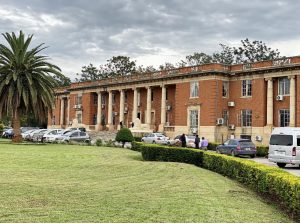The Department of National Parks and Wildlife (DNPW) under the Ministry of Tourism would like to inform the GENERAL PUBLIC that there are confirmed outbreaks of Anthrax in wildlife with confirmed cases in the Hippos and the Buffalos and livestock in the following areas: Sinazongwe, Mwandi (Simalaha Conservancy), Sesheke and Lumezi Districts.
These outbreaks pose a huge public health threat due the severeness of the Anthrax disease in humans and in animals especially considering the current human-animal interface which exists in the protected areas particularly in the Game Management Areas where these cases have been confirmed.
Anthrax disease is a disease which is caused by a spore forming bacteria known as Bacillus anthracis. The spores of this bacteria naturally exist in the ground and are endemic to of certain localities of the world and also in specific parts of Zambia.
When the anthrax spores get inside the body, they can get “activated” and become what is known as the vegetative stage/ form and the bacteria can then multiply, spread out in the body, produce more toxins and cause severe illness. This can happen when people breathe in spores, eat food or drink water contaminated with spores, or get spores in a cut or scrape in the skin
Signs and symptoms of the anthrax disease depend on how a person is infected, they can include; skin sores, vomiting and shock. Inhaled anthrax is more difficult to treat and can be fatal hence the need to take immediate actions.
By the 26th October 2023, Sinazongwe district had recorded 205 human cases, Lumezi district has recorded 9 human cases with 1 suspected human mortality. These human cases are linked to the consumption of meat from wildlife and livestock carcasses and could also be because of sharing same water points with the affected animals.
As a result, DNPW has taken immediate measures to prevent the spread of the disease in wildlife and humans in the affected areas as prescribed in Part (k) under section XIII of the Zambia Wildlife Act of 2015 by applying the following:
- The signs in livestock and wildlife are: Sudden mortalities, blood coming out of all natural orifices. The public is therefore being urged to report any such case to the nearest DNPW office or the nearest District Veterinary Office.
- The Public is being urged NOT to get close to the carcasses to avoid inhaling or coming into contact with the spores which can lead to severe illness in humans. The public should contact the experts to examine the carcass and to collect the samples in the most appropriate way.
- The Ministry of Tourism will uphold the instituted animal/trophy movement BAN from high-risk areas in accordance with the Animal Health Act No. 27 of 2010 in collaboration with the Ministry of Fisheries and Livestock; To avoid the disruption of hunting, the Ministry will work closely with the regional DNPW offices and with the office of the District veterinary office so that hunting should only take place in areas which are reasonably far from the disease hotspots and have not recorded any case. All the hunted carcasses/ trophies will be inspected and moved in the most appropriate way.
- The Ministry of Tourism has embarked on conducting sensitization programs in the affected areas to build awareness.
- The general public is also being advised to source their meat from reputable DNPW registered game meat dealers. This is because the untrusted sources of bush meat could be selling infected meat.
- Any suspicious carcass of wildlife or livestock in the protected areas and the surrounding communities should be reported to the nearest DNPW office or the District Veterinary Officers immediately.
- Further, the Ministry of Tourism will champion and foster the agenda of capture and translocation of the Hippos from the over populated and prolific areas to relocate them to the understocked or depleted protected areas this is to keep the populations within the recommended carrying capacities.
- The Ministry of Tourism will continue encouraging and strengthening the collaboration in research by working closely with the Universities on how best we can minimize the spread of the Anthrax Disease and prevention of future outbreaks by studying the many factors which lead to the outbreaks e.g. climate change, over population and illegal trade in wildlife products.
- The Ministry of Tourism will also work with the communities so as to reduce further encroachment into the protected areas which has a positive impact on the reduction of possible anthrax spread through reduction in the human- animal- wildlife interphase.
Issued by:
Honourable Rodney M. Sikumba, MP
MINISTER OF TOURISM








